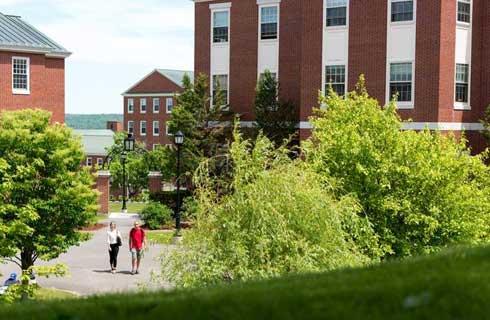Bachelor of Science in Biotechnology

学历文凭
Bachelor Degree

专业院系
生物技术

开学时间

课程时长

课程学费

国际学生入学条件
To be admitted to an undergraduate degree program as a regular freshman student, you must be a graduate from an approved or accredited high school (GED certificate may not be used for admission) and satisfy the below requirements:
You must have a 3.0 weighted GPA in the academic core courses in order to be admitted to the University of Nevada, Reno. The academic courses include: English, math, social sciences and natural sciences. A weighted GPA takes into account the extra difficulty of honors, AP or IB classes.
You must submit your final, official high school transcripts to support your application for admission.
SAT/ACT scores: We do not require SAT or ACT scores for admission or scholarship consideration
IELTS (must be academic version) with a score of 6.0 plus
TOEFL score 61 plus
IDP—雅思考试联合主办方

雅思考试总分
6.0
了解更多
- 雅思总分:6
- 托福网考总分:61
- 托福笔试总分:160
- 其他语言考试:Duolingo- 95
CRICOS代码:
申请截止日期:请 与IDP联系 以获取详细信息。
课程简介
This four-year B.S. degree in Biotechnology is designed for students who plan to seek employment in the Biotechnology industry upon graduation. Students also have the option of continuing their studies by applying to the accelerated, one year M.S. Biotechnology Graduate Program (see link), or through a Ph.D. program. The Biotechnology bachelor’s program focuses heavily on coursework in the molecular biological sciences and provides a research experience in an academic andor industrial setting. Participation in authentic research gives students the opportunity to apply their theoretical knowledge while gaining technical skills and real-world experience. At the end of their senior year, students may apply for the one year M.S. Biotechnology program (see link). Seniors with a 3.0 or higher have the option of enrolling in 1-2 approved graduate-level courses for each semester of their senior year. This program is not recommended for students wanting to enter medical, dental school or other allied health professions (instead, see B.S. degree in Biochemistry and Molecular Biology). Students will be able to: demonstrate mastery of foundational knowledge in biotechnology, including biochemistry, molecular biology, and cell biology and biotechnology applications of this knowledge. attain a range of practical laboratory skills, including basic and advanced techniques in biochemical analysis, molecular biology, protein chemistry, and genetic engineering. analyze and solve complex problems in biotechnology, both independently and in collaboration with others, using a combination of quantitative and qualitative reasoning. effectively communicate scientific information and research results in a variety of formats, including written reports, oral presentations, and scientific posters. demonstrate a comprehensive understanding of the ethical principles and regulations that govern biotechnology research and practice, while also exhibiting professionalism in all interactions with colleagues, supervisors, and the public. acquire the necessary skills and knowledge to confidently pursue entry-level positions in the biotechnology industry, academia, government agencies, or other relevant settings.
相关申请

预科

奖学金

实习机会

在校学习

跨境学习

校园授课-线上开始

在线/远程学习
本校相关课程
Master of Music in Music Education

学历文凭
Masters Degree
下一个开始日期
课程费用总额
Master of Arts in Music

学历文凭
Masters Degree
下一个开始日期
课程费用总额
Bachelor of Arts in Women's Studies

学历文凭
Bachelor Degree
下一个开始日期
课程费用总额
Bachelor of Science in Wildlife Ecology and Conservation

学历文凭
Bachelor Degree
下一个开始日期
课程费用总额
Bachelor of Science in Veterinary Science

学历文凭
Bachelor Degree
下一个开始日期
课程费用总额
Doctor of Philosophy in Speech Pathology

学历文凭
Ph.D.
下一个开始日期
课程费用总额
其他相关课程
Master of Science in Biology - Biotechnology, Scholarly Paper Track

艾德菲大学-Shorelight
泰晤士高等教育世界大学排名:

学历文凭
Masters Degree
下一个开始日期
课程费用总额
Bachelor of Science in Horticultural Science - Plant Biotechnology and Improvement

佛罗里达大学
泰晤士高等教育世界大学排名:136

学历文凭
Bachelor Degree
下一个开始日期
课程费用总额
Ontario College Diploma in Hairstyling (Fast Track)

圣克莱尔学院
泰晤士高等教育世界大学排名:

学历文凭
Bachelor Degree
下一个开始日期
课程费用总额
生物技术哲学博士-化学生物技术

布鲁克大学
泰晤士高等教育世界大学排名:

学历文凭
Ph.D.
下一个开始日期
课程费用总额
生物技术学士学位(荣誉学位)

西三一大学
泰晤士高等教育世界大学排名:

学历文凭
Bachelor Degree with Honours
下一个开始日期
课程费用总额
Bachelor of Arts in Agricultural Biotechnology

莱斯布里奇大学
泰晤士高等教育世界大学排名:

学历文凭
Bachelor Degree
下一个开始日期
课程费用总额




